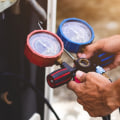Amana HVAC Air Filter Replacements | Your Shield Against Harmful Indoor Air Pollutants
Replacing air filters is an integral part of maintaining your indoor space as healthy as it can get. The lack of such a simple thing as replacing the air filter is just what invites an entire retinue of contaminants, including dust and allergens, right into your house. Properly choosing a replacement schedule for your Amana HVAC air filters can greatly improve indoor air quality. How can one tell when they should be replaced, and which ones are best to suit specific needs? We discuss this below.
Know when to replace filters. Typical testing will permit conclusions of whether they are obstructed or filthy. Other potential signs will be restricted airflow and increased allergies. The basic rule of thumb is to change them every one to three months; however, conditions in a particular setting could necessitate monthly changes: pets, smoking, and strong pollen counts.
It is also important to select the proper filter. Amana offers a variety of options that have different purposes. HEPA filters trap particles really well, and pleated filters allow for better airflow. Having an idea about your household's air quality challenges will help address the type of filter best suited for the job.
It's very important not to look down upon indoor air quality. Frequently changing the filters will ensure that the environment is clean and healthy for everybody. It will save you a lot by simply being aggressive while reaping lifelong benefits for you and your family.
Key Takeaways
Changing regular filters in Amana HVAC assures good indoor air quality, as it can capture dust, pollen, and other harmful particles.
The higher the MERV rating a filter has, the greater the effectiveness of filtration; hence, fewer allergens mean better health.
Replace the filters every 1 to 3 months, depending on how dusty your environment is or for homes with pets.
Monthly checks on filters allow for early detection. If visible dirt or dust can be seen, then it is time for a replacement to maintain airflow.
The finances invested in HEPA filters by Amana Systems pay off significantly, with 99.97% effectiveness in the cleanliness of the air.
Importance of Air Filters
Air filters play an important role in the efficiency of HVAC systems and indoor air cleanliness. High-quality filters enhance the efficiency by the effective trapping of dust, pollen, and all the particles injurious to health. Much cleaner air circulates in the living spaces of a home this way and contributes positively towards health benefits.
Changing the air filters regularly allows the HVAC systems to function at peak capacity. Clean filters put less stress on systems, equating to lower energy consumption and allowing them to extend the life of the equipment. On the whole, cleaner air can also reduce allergy symptoms in the family, as well as other types of respiratory problems as a method of keeping families healthier.
But it also makes a difference by choosing the proper filter. Look for options that hold higher MERV ratings, which is indicative of better filtration. This can make all the difference in the world in daily air quality.
Signs Your Filter Needs Replacement
Knowing precisely when to change the HVAC air filter will considerably improve its effectiveness. A dirty or clogged filter cuts down airflow, overworks the system, and diminishes the quality of indoor air. Here are indications that a filter should be replaced:
Costly energy bills: The ill effects of a dirty filter include restricted airflow, making the system work harder, thereby giving rise to increased energy costs all of a sudden.
Accumulation of dust and debris: When dust seems to collect on either the vent or the surfaces, it is likely that the filter is no longer effective and should be changed.
Bad odors: If the odors are musty or foul, they may point to mold or contaminants being trapped in the filter and impinging on indoor air quality.
Exceeding filter lifespan: Know the life of your filter. More than three months have passed or if it has served beyond the recommendation set by its manufacturer, then you might want to replace it.
How to Select the Right Air Filter
The major types are fiberglass, pleated, and HEPA filters. While fiberglass filters can be cheap in the market, their efficiency in capturing small particles remains small. The pleated filters give a good balance between economy and efficiency because they capture more dust and allergens. For better filtration, HEPA filters excel in capturing 99.97% of particles with a diameter of 0.3 microns or larger.
Another important attribute is the ratings of filters, given by the efficiency of capturing particles. The Minimum Efficiency Reporting Value system provides a good metric to judge performance. The higher the MERV rating, the better the filtration; this can also impact the airflow in return, though. Choosing a filter means finding a balance between effective air cleaning and compatibility with the HVAC system.
Replacement Frequency Guidelines
Understanding filter types along with their ratings plays a significant role in maintaining HVAC systems; awareness of how often to replace air filters holds equal importance. Regular filter changes guarantee optimal performance and enhance indoor air quality. The lifespan of filters can differ based on various factors, so adhering to a maintenance schedule tailored to specific requirements is essential.
Here's a general guideline for replacement frequency:
Every 1-3 months: Households with pets or those in dusty environments may find filters clogging more quickly.
Every 3-6 months: This timeframe suits most homes with limited dust and without pets.
Every 6-12 months: High-efficiency filters or less frequently used HVAC systems can follow this schedule.
As needed: Monthly filter checks are advisable. If filters appear dirty, replacement should happen sooner.
Additional Tips for Air Quality
Improving indoor air quality can greatly enhance comfort and health. Start by ensuring ventilation systems function properly. Regular maintenance and inspections help prevent dust and allergens from building up, allowing fresh air to circulate throughout your home.
Consider investing in air purification systems. These devices effectively remove harmful particles, allergens, and odors from indoor air. Choose a purifier that fits your space size and has a HEPA filter for the best results.
Pay attention to humidity levels within your home. High humidity promotes mold growth, while low humidity leads to dry skin and respiratory issues. Using a dehumidifier or humidifier helps maintain a balanced environment.
Frequently Asked Questions
Can I clean and reuse my Amana HVAC air filter?
Cleaning and reusing an Amana HVAC air filter isn't effective. For proper maintenance, regular replacement is recommended. If cost-saving is a priority, consider specific techniques for filters designed for reuse.
What size air filter does my Amana system require?
To find the filter size for an Amana system, check the current filter or refer to the owner's manual. Verifying dimensions is vital for peak performance, so confirm compatibility before buying a replacement.
Where can I purchase Amana HVAC air filters?
Amana HVAC air filters are available from multiple online retailers such as Amazon and Home Depot. Local hardware stores or home improvement shops may also carry them, providing immediate access and convenience.
Do air filters affect my HVAC system's energy efficiency?
Air filters significantly impact HVAC system energy efficiency. Regular maintenance of filters promotes proper airflow, resulting in energy savings. When filters are neglected, the system must exert more effort, which raises energy consumption and costs.
Is there a specific brand of filter recommended for Amana systems?
For Amana systems, ensuring filter compatibility is essential. Regularly check replacement frequency, usually every 1-3 months, to keep performance at its best and enhance energy efficiency. Using brands recommended by the manufacturer often leads to optimal results.
Learn more about HVAC Care from one of our HVAC solutions branches…
Filterbuy HVAC Solutions - Miami FL - Air Conditioning Service
1300 S Miami Ave Apt 4806 Miami FL 33130
(305) 306-5027
https://maps.app.goo.gl/Ci1vrL596LhvXKU79



